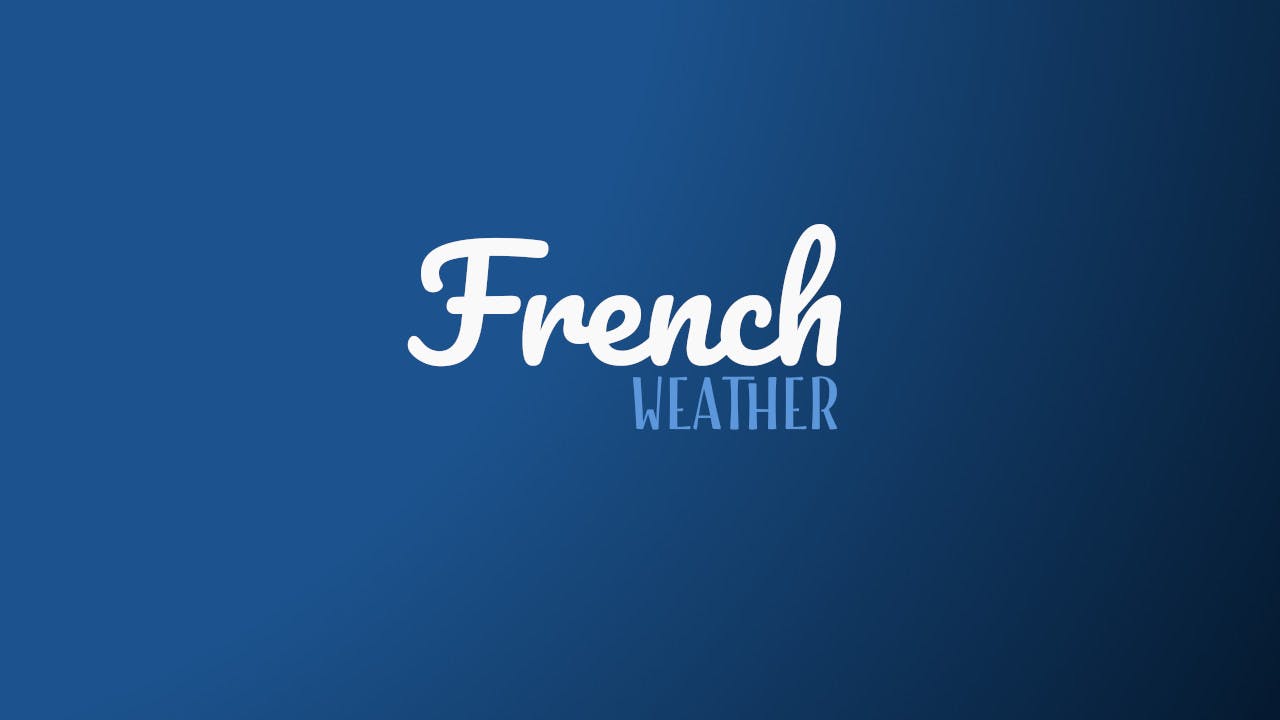How To Talk About The Weather In French
Talking about the weather is one of the best ways to spark up a conversation in French.
It's also something you'll use a LOT when talking with Parisians (since they love to complain about the weather!). 🙂 🌧️
How do you say 'weather' in French?
If you want to say 'weather' in French, there are two words you should know:
- météo
- temps
The word météo is feminine, so it's used with feminine articles (e.g. la météo).
Temps is masculine, so it uses the le article.
The difference between météo and temps
In French, both météo and temps refer to the weather, but they have important nuances.
Météo is a more technical term that refers to the science or study of weather, including forecasts. Think of the English word "meteorology".
Temps is the more general and informal term for weather (can also refer to time). This is the term you'll use to ask the average person what the weather is like.
If there's one word you learn in this lesson, focus on temps as you'll use it a lot in conversations.
Asking "how's the weather?" in French
Now that you know the difference between these two words, here's how you ask someone what the weather is like:
Comment est le temps ?
Quel temps fait-il ?
Weather vocabulary in French
Now you want to answer a person who asks you the same question. For this, you'll need vocabulary.
Here's a table of all the most common weather types in French.
| French | English |
|---|---|
| Ensoleillé | Sunny |
| Nuageux | Cloudy |
| Pluvieux | Rainy |
| Orageux | Stormy |
| Neigeux | Snowy |
| Brumeux | Foggy |
| Venté | Windy |
| Chaud | Hot |
| Froid | Cold |
| Doux | Mild |
| Humide | Humid |
| Sec | Dry |
| Glacial | Freezing |
| Frais | Cool |
| Tempête | Tempest |
| Canicule | Heat wave |
| Gel | Frost |
| Gelée | Freeze |
| Avalanche | Avalanche |
| Ouragan | Hurricane |
| Tornade | Tornado |
| Éclair | Lightning |
| Tonnerre | Thunder |
| Grêle | Hail |
There are obviously more than this, but these are the most important ones.
Sample dialogues
Here are some important sample sentences to demonstrate asking for and sharing the weather in French.
Quel temps fait-il aujourd'hui?
Il fait beau.
The weather is bad.
Il fait chaud.
Il y a du vent.
Il pleut.
Il fait froid.
Il neige.
Il fait soleil.
Il fait couvert.
Il fait lourd.
Il grele.
Il gele.
Il degele.
Il tonne.
Il y a de l'orage.
Il y a des eclairs.
Quand le ciel est bleu, il fait du soleil-il fait beau temps.
Quand le ciel est gris, it est couvert de nuages-il fait mauvais temps.
A Paris, il pleut quelquefois.
A Cote d'Azur, il pleu rarement; il fait generalement beau.
We usually use faire (il fait, or past tense il faisait) for the weather. For example:
- Il fait mauvais
- Il fait chaud
However, to rain, to snow, to hail, to freeze, thaw and to thunder are verbs in their own right, and are used without faire.
Talking about seasons in French
| French | English |
|---|---|
| Le printemps | Spring |
| L'été | Summer |
| L'automne | Fall / Autumn |
| L'hiver | Winter |
Robert, quelle saison aimez-vous le mieux?
J'aime bien l'hiver quand il neige et on peut faire du ski.
J'aime bien l'ete, parce qu'il y a de belles fleurs.
Discussing meteorology (le meteo) in French
Here are a few more sample sentences to finish up:
Le matin, le soleil se leve. Le soir, le soleil se couche.
Le soleil se leve a l'est. Le soleil se couche a l'ouest.
Pendant le jour, le soleil est dan le ciel.
Pendant la nuit le soleil n'est pas visible, mais nous pouvons voir la lune et les etoiles.
En ete, le soleil se leve de bonne heure.
En hiver, le soleil se leve tard.

SUBSCRIBE: